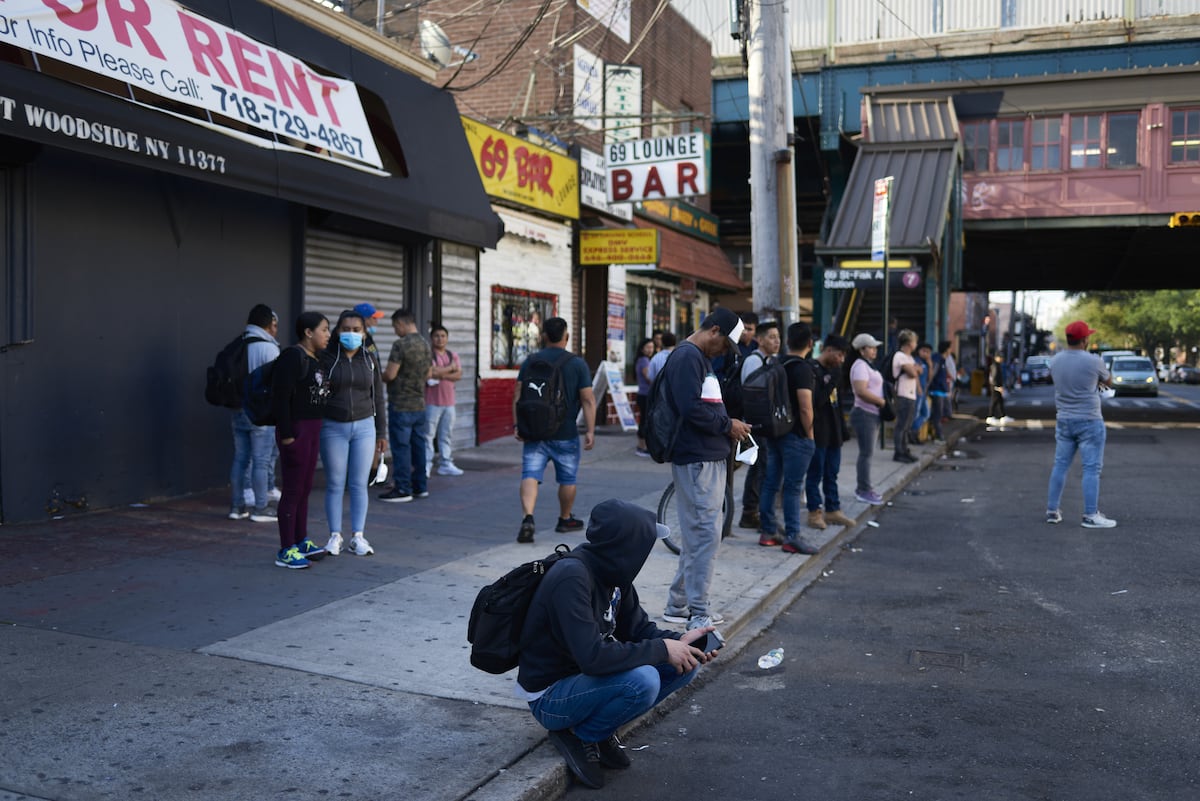The fear of mass deportations—and possible family separations—hangs like a slab over tens of thousands of migrants like those who attended a food distribution for the Thanksgiving holiday last Friday, organized by the NGO New Immigrant Community Empowerment. (NICE, in its English acronym). For many of them, this Thursday will be their first Thanksgiving, the most important date on the American holiday calendar, but also the last if Donald Trump’s plans to expel undocumented immigrants (11.3 million in the United States) , 412,000 in New York) are substantiated above the abundant technical complexities (file management, the greatest of all).
Gladys Carolina, a Venezuelan, who arrived in New York in March with her husband and two children, ages 17 and 9, relativizes the threat, but does not hide her anxiety. “Those of us who have crossed the Darién and survived the Beast [el tren de carga que atraviesa México]we can face anything, except returning to Venezuela, never that. But of course we fear what may happen, we are in suspense, because it is an unknown.” Beside him, Carolina López, a 28-year-old Ecuadorian, clings to the bag with the turkey that the NGO has given her while she cradles two-month-old Liam. Her otherwise blissful first Thanksgiving dinner is marred by fear that a removal order will separate her from her son. “I’m terrified for the baby, because if they deport me they will leave him here, where he was born. My husband hopes to receive permission to work soon, but it seems that doesn’t guarantee anything either,” she explains. According to immigration lawyers, the ongoing process does not exempt from deportation.
The first, beneficiary with the rest of her family of the so-called temporary protected status (TPS) because she comes from Venezuela, runs the same risk of expulsion as the second, an economic immigrant without legal protection. For the future Republican Administration, there are no differences, and the two million legal temporary residents, like Gladys Carolina and her family—in total, 4% of the foreigners living in the United States in 2022, according to Pew Research Center—are today little less than a toast to the sun of the complex, and dysfunctional, immigration system, which right now has 3.7 million files pending resolution. At the current pace, its processing would take four years, but it could take up to 16 under the president-elect’s mass deportation plan. The entire operation could cost taxpayers between $150 billion and $350 billion.
Human rights groups and activists have asked President Joe Biden to accelerate measures to protect the most exposed migrants, those without papers, but also holders of a green cardthe once precious residence and work permit, which will no longer protect. Among the members of the NICE community, “there are diverse immigration statuses: people with TPS, DACA beneficiaries [el programa de la era Obama para quienes llegaron al país de niños, y contra el que ya arremetió Trump en su primer mandato]people without any type of papers, even after 20 or 30 years in the country; some married to Americans or with American children,” explains Nilbia Coyote, executive director of the NGO. All of them have in the laws of the State of New York an additional guarantee that, for example, the undocumented day laborers of Southern California, foreseeable instant victims of Trump’s plans, lack.
“All these people are part of New York, and they are a visible part, who no longer live in the shadows thanks to years of work and struggle. New York is a sanctuary city [refugio] and we are going to defend that condition against any divisive rhetoric. We have experienced other crises, such as the pandemic or the one that started in the spring of 2022, when tens of thousands of immigrants began to be sent to Democratic cities such as New York, Denver, Boston or Chicago by the Republican governor of Texas to pressure the Federal Government, and NICE then took in a thousand a month. “Eight years ago [primera presidencia de Trump] and two weeks ago we heard the same thing: ‘I have to go to work at 3 in the morning to chain three shifts in a row,’ Coyote continues, ‘that’s the reality.’
The director of NICE relativizes contingency plans to emphasize that what is urgent should not relegate what is important, “empowering those who arrive with a learning plan for daily life, on how to process the State card [de NY, un documento de identidad legal incluso para los sin papeles]the driving license, how to open a bank account… They are resilient people, who have crossed seven or eight borders and of course they have anxiety, feelings… but they are not alone. “We cannot allow ourselves to be carried away by fear just when there is most to do.”
Legal services, waiting
Omayra, a volunteer who regulates the line for food delivery, says that to calm things down they usually tell them that the deportation plans will first affect those with a criminal record or a previous expulsion order, an assumption confirmed by the person himself. border tsar of the incoming Administration, Tom Homan. But no one is immune from a chance encounter with police officers on the street, for example. “Our legal team is prepared to respond to urgent cases, mental health services have also been reinforced, but we have to wait and see what the deportation machinery is,” emphasizes Coyote. Gladys Carolina says she is not afraid of a run-in with the police, “we are good people, our record is as clean as a whistle,” but her Ecuadorian namesake suffers every time her husband ventures into the neighborhood. “When he delays and returns late to the shelter, I already fear that something has happened to him,” he explains.
In other parts of the country, such as agricultural areas, where work by undocumented immigrants is the norm, NGOs remind them that they have the right to remain silent if they are detained, that they should only open the door to immigration agents with an order of judicial registration, that they should not sign any paper without a lawyer present, and, very especially, that they prepare a family contingency plan: a power of attorney or equivalent in case they are separated from their children, in favor of any remaining guardians in your charge.
“We don’t want to encourage more fear, but we do want everyone to be prepared for any eventuality,” said Luz Gallegos, executive director of Centro Legal TODEC, a California NGO that holds daily briefings in workplaces after their phone was overwhelmed by a flood of queries as soon as the results of the elections were known.
The uncertain fate of an undocumented person will differ greatly from their place of residence: it is rather black in Texas, which has been proposed as the great springboard for repatriation; ambiguous in California, with a legion of irregulars without whose work there would be no crops, or more benign in New York, where they are mostly employed in construction and services. “The entire country would stop if they deported the migrants,” Coyote recalls. The Big Apple, “in addition to offering them aid” such as the aforementioned state identification card, food stamps or health care like the one that allowed Carolina López to give birth “without any type of problem or papers” in a large hospital, also protects, theoretically, with laws that limit the Police Department’s cooperation with federal agents when executing a deportation order. Of course, one rank above the local police, the feared Immigration and Customs Enforcement Service (ICE) has the prerogative to detain people in the city even though neither the city nor the State have external borders.
It is still a paradox that the city that has barely managed to accommodate more than 223,000 new migrants in the last two years — more than 150,000 have already left the shelter system and live on their own or have left to the other side—is now forced in the opposite direction, that of expelling them. The mayor, Democrat Eric Adams – greatly diminished politically after being charged with corruption – has said that he opposes mass deportations, but not those accused of crimes. Both Gladys Carolina and Carolina López still live in shelters, but on Thanksgiving they will carve the turkey that NICE gave them at the homes of acquaintances and relatives who have already taken a step towards integration and live in shared apartments. “What harm do we do if the only thing we intend to do is work and live decently to raise our child?” asks Carolina López. “Staying in the United States is not a whim or a dream, it is the only possible option, because we cannot return to Venezuela,” concludes Gladys.









